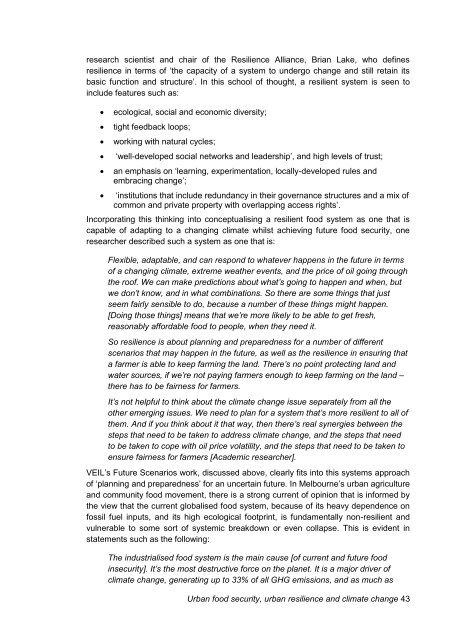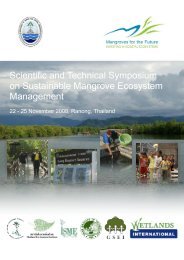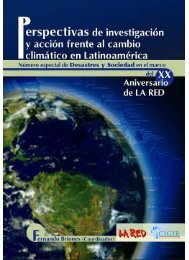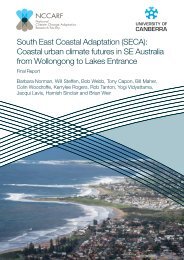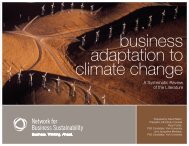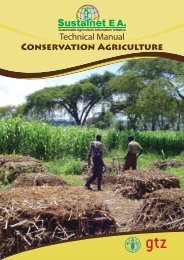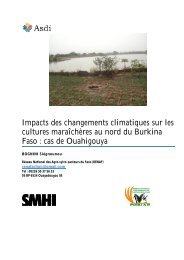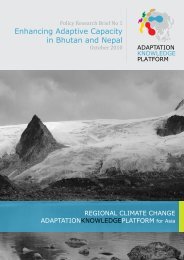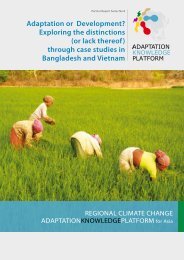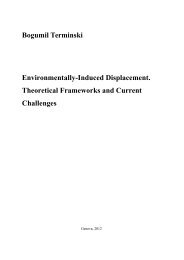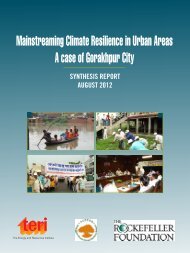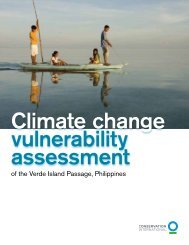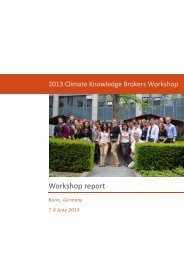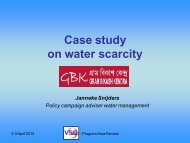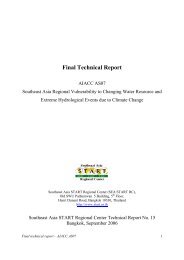esearch scientist <strong>and</strong> chair of the Resilience Alliance, Brian Lake, who defines<strong>resilience</strong> in terms of ‘the capacity of a system to undergo <strong>change</strong> <strong>and</strong> still retain itsbasic function <strong>and</strong> structure’. In this school of thought, a resilient system is seen toinclude features such as:ecological, social <strong>and</strong> economic diversity;tight feedback loops;working with natural cycles;‘well-developed social networks <strong>and</strong> leadership’, <strong>and</strong> high levels of trust;an emphasis on ‘learning, experimentation, locally-developed rules <strong>and</strong>embracing <strong>change</strong>’;‘institutions that include redundancy in their governance structures <strong>and</strong> a mix ofcommon <strong>and</strong> private property with overlapping access rights’.Incorporating this thinking into conceptualising a resilient <strong>food</strong> system as one that iscapable of adapting to a changing <strong>climate</strong> whilst achieving future <strong>food</strong> <strong>security</strong>, oneresearcher described such a system as one that is:Flexible, adaptable, <strong>and</strong> can respond to whatever happens in the future in termsof a changing <strong>climate</strong>, extreme weather events, <strong>and</strong> the price of oil going throughthe roof. We can make predictions about what’s going to happen <strong>and</strong> when, butwe don’t know, <strong>and</strong> in what combinations. So there are some things that justseem fairly sensible to do, because a number of these things might happen.[Doing those things] means that we’re more likely to be able to get fresh,reasonably affordable <strong>food</strong> to people, when they need it.So <strong>resilience</strong> is about planning <strong>and</strong> preparedness for a number of differentscenarios that may happen in the future, as well as the <strong>resilience</strong> in ensuring thata farmer is able to keep farming the l<strong>and</strong>. There’s no point protecting l<strong>and</strong> <strong>and</strong>water sources, if we’re not paying farmers enough to keep farming on the l<strong>and</strong> –there has to be fairness for farmers.It’s not helpful to think about the <strong>climate</strong> <strong>change</strong> issue separately from all theother emerging issues. We need to plan for a system that’s more resilient to all ofthem. And if you think about it that way, then there’s real synergies between thesteps that need to be taken to address <strong>climate</strong> <strong>change</strong>, <strong>and</strong> the steps that needto be taken to cope with oil price volatility, <strong>and</strong> the steps that need to be taken toensure fairness for farmers [Academic researcher].VEIL’s Future Scenarios work, discussed above, clearly fits into this systems approachof ‘planning <strong>and</strong> preparedness’ for an uncertain future. In Melbourne’s <strong>urban</strong> agriculture<strong>and</strong> community <strong>food</strong> movement, there is a strong current of opinion that is informed bythe view that the current globalised <strong>food</strong> system, because of its heavy dependence onfossil fuel inputs, <strong>and</strong> its high ecological footprint, is fundamentally non-resilient <strong>and</strong>vulnerable to some sort of systemic breakdown or even collapse. This is evident instatements such as the following:The industrialised <strong>food</strong> system is the main cause [of current <strong>and</strong> future <strong>food</strong>in<strong>security</strong>]. It’s the most destructive force on the planet. It is a major driver of<strong>climate</strong> <strong>change</strong>, generating up to 33% of all GHG emissions, <strong>and</strong> as much as<strong>Urban</strong> <strong>food</strong> <strong>security</strong>, <strong>urban</strong> <strong>resilience</strong> <strong>and</strong> <strong>climate</strong> <strong>change</strong> 43
50% of humanity’s total eco-footprint. It leads to soil degradation <strong>and</strong> erosion, itpollutes waterways, it creates dead zones in the oceans, <strong>and</strong> it is highly energyintensive … A resilient <strong>food</strong> system [on the other h<strong>and</strong>] means being able to keepgoing when the lights go off, being able to deal with radically less energy[Community <strong>food</strong> activist].<strong>and</strong>;The Garnaut report said that by 2100, 90% of irrigation agriculture in Australia willbecome unviable. Are people not thinking about what that means? To reallyunderst<strong>and</strong> this is a massive <strong>change</strong>. We’re running out of cheap oil, <strong>and</strong> wehave <strong>climate</strong> <strong>change</strong>, it seems crazy that we would [just] rely on [large-scalesystems that seem likely to break down] – [Backyard gardener <strong>and</strong>permaculturalist].<strong>and</strong>;With Peak Oil, the viability of transporting large amounts of <strong>food</strong> long distancesdiminishes. With <strong>climate</strong> <strong>change</strong>, it looks like farmers are struggling already, <strong>and</strong>their production methods are unsustainable. They’ve got two things workingagainst them: the <strong>climate</strong>’s getting less supportive of their activities, <strong>and</strong> theiractivities are unsustainable to begin with … especially in terms of watershortages. It’s all looking rather shaky. In fact, it’s looking like we can’t depend onour rural sector to provide us with all our <strong>food</strong> … We’re pretty well gearing up forthe worst in the <strong>climate</strong>; <strong>and</strong> the worst-case scenario in the rural sector. Andfrankly – I hate to say this – the <strong>food</strong> that’s coming out of there is crap anyway,because of all the commercial pressures from the supermarkets on them to keepdropping their prices. So they have to use as many short-cuts as they can to stayafloat … I did some research <strong>and</strong> found out that, compared to 20 years ago, anapple today has only 25% of the nutrient value it did back then, because it’spicked unripe, stored in a fridge for months, then chemically ripened. That’sreally, really scary … So [those are the reasons] why we’re looking to [<strong>urban</strong>]public l<strong>and</strong> as the [future] basis of resilient <strong>food</strong> sources [Permaculturalist <strong>and</strong><strong>food</strong> forest advocate].A resilient <strong>food</strong> system, on the other h<strong>and</strong>, will, according to most interviewees, have anumber of features that will enable it to cope with a variety of external <strong>and</strong> systemicshocks (including <strong>climate</strong> <strong>change</strong> <strong>and</strong> Peak Oil); <strong>and</strong> also be capable of deliveringfairness <strong>and</strong> social justice, for farmers <strong>and</strong> consumers. Terms such as ‘wasteminimisation’, ‘import-dependence minimisation’, greater levels of ‘<strong>food</strong> self-reliance<strong>and</strong> self-sufficiency’, eradicating the need for emergency <strong>food</strong> relief, <strong>and</strong> creatinglocalised <strong>and</strong> sustainable supply systems were all mentioned on a number ofoccasions:A resilient <strong>food</strong> system would work from <strong>food</strong> production, to consumption, retail<strong>and</strong> waste, <strong>and</strong> how we deal with that. A functioning, coherent system, thatprovides well for everybody in the population [Manager, non-governmentorganisation].<strong>Urban</strong> <strong>food</strong> <strong>security</strong>, <strong>urban</strong> <strong>resilience</strong> <strong>and</strong> <strong>climate</strong> <strong>change</strong> 44
- Page 1 and 2: Synthesis and Integrative ResearchF
- Page 3 and 4: Published by the National Climate C
- Page 5 and 6: ABSTRACTFood security is increasing
- Page 7 and 8: 1. a review of the literature: on n
- Page 9 and 10: its Food for All project. This help
- Page 13 and 14: In response to the existential thre
- Page 15 and 16: 2. OBJECTIVES OF THE RESEARCHFood i
- Page 17 and 18: debates and to the more systematic
- Page 19 and 20: organisation in the past few years.
- Page 21 and 22: 4. RESULTSIn this section we presen
- Page 23 and 24: increasing productivity. Thus, whil
- Page 25 and 26: people and the origins of their foo
- Page 27 and 28: urban food supply chains. Thus, whi
- Page 29 and 30: This logistics system is dominated
- Page 31 and 32: Like Hodgson et al., as per definit
- Page 33 and 34: esilient, powerful by being locally
- Page 35 and 36: volume or even its contribution to
- Page 37: community food growing can have on
- Page 40 and 41: generations this history has been f
- Page 42 and 43: a stronger focus on addressing the
- Page 44 and 45: The third key aspect is fairness -
- Page 46 and 47: climate (which we live and work in
- Page 48 and 49: agriculture. Eight percent is in ur
- Page 50 and 51: This concept of the ‘spaces in be
- Page 54 and 55: As discussed above, protection of t
- Page 56: 4.2.5 What is the extent and the im
- Page 60 and 61: no place under the panoply of pract
- Page 62 and 63: increased, the market dominance of
- Page 64 and 65: … the residents of S Park called
- Page 66 and 67: 5. CONCLUSIONSThere is growing conc
- Page 68 and 69: urban resilience. This inevitably c
- Page 70 and 71: In many respects these contrasting
- Page 72 and 73: Many interviewees of both standpoin
- Page 74 and 75: a given area. The rationale for thi
- Page 76 and 77: mapping the location of sources of
- Page 78 and 79: Australian food policy debates refl
- Page 80 and 81: APPENDIX 1: URBAN FOOD SECURITY, UR
- Page 82 and 83: IntroductionGlobally, and in Austra
- Page 84 and 85: Review methodsThis stage of the res
- Page 86 and 87: despite many of the causes of food
- Page 88 and 89: …by 2050… food production will
- Page 90 and 91: 2. How is food security (in general
- Page 92 and 93: the food security of cities, but no
- Page 94 and 95: While some see the density of devel
- Page 96 and 97: when suppliers, distributors, and c
- Page 98 and 99: a more prominent role in enhancing
- Page 100 and 101: community gardens webpage on the Co
- Page 102 and 103:
comprehensive description of the ca
- Page 104 and 105:
In both the developed and developin
- Page 106 and 107:
Their review notes a significant in
- Page 108 and 109:
lines of supply from often rural pl
- Page 110 and 111:
1 IntroductionCities have always be
- Page 112 and 113:
Despite some attempts to curb urban
- Page 114 and 115:
the Gold Coast remains a city that
- Page 116 and 117:
ackyard/community gardenernot affil
- Page 118 and 119:
level in local government. VicHealt
- Page 120:
Figure 2: Impacts on Municipal Food
- Page 125 and 126:
security I recognise that the cost
- Page 127 and 128:
United States, he offered the follo
- Page 129 and 130:
This vision highlights the multi-fu
- Page 131 and 132:
An environmental education centre.
- Page 133 and 134:
Melbourne Food ForestA Melbourne ga
- Page 135 and 136:
stakeholder consultations, the repo
- Page 137 and 138:
can. We sense the changes. The earl
- Page 139 and 140:
half-desert environments. We’re g
- Page 141 and 142:
etain its basic function and struct
- Page 143 and 144:
government; and that trying to get
- Page 145 and 146:
the north and the west, where it wo
- Page 147 and 148:
Why do people buy so much food that
- Page 149 and 150:
urban agriculture (however broadly
- Page 151 and 152:
enefits and risks. Before we can co
- Page 153 and 154:
Another important and tangible role
- Page 155 and 156:
coast without any problems whatsoev
- Page 157 and 158:
BIBLIOGRAPHYAECOM (2011) Scoping St
- Page 159 and 160:
Burns, C. I., A. (2007). Measuring
- Page 161 and 162:
Edwards, F., & Mercer, D. (2010). M
- Page 163 and 164:
James, S. O’Neill, P. and Dimeski
- Page 165 and 166:
Millar, R., 2012, ‘Government shi
- Page 167 and 168:
Saltmarsh, N. M., J; Longhurst, N.
- Page 169 and 170:
Walker B., 2008, Resilience Thinkin


